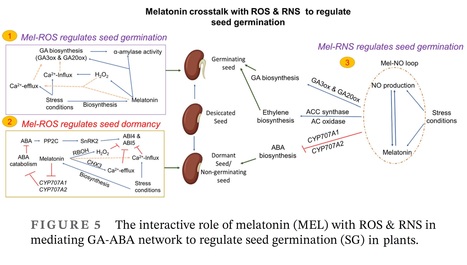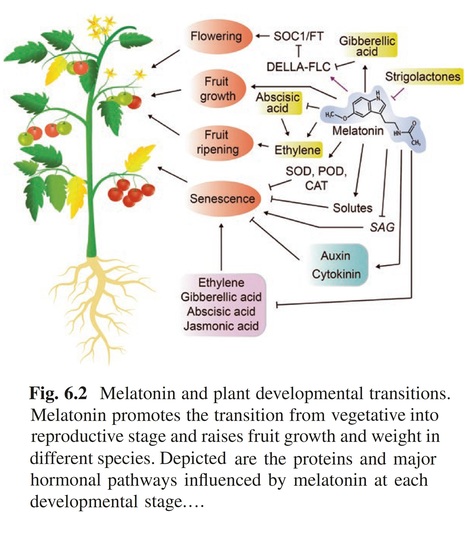 Your new post is loading...
 Your new post is loading...
Authors: Lei Wang, Mohsin Tanveer, Hongling Wang and Marino B. Arnao.
Journal of Pineal Research (2024)
Abstract: "Seed germination (SG) is the first stage in a plant's life and has an immense importance in sustaining crop production. Abiotic stresses reduce SG by increasing the deterioration of seed quality, and reducing germination potential, and seed vigor. Thus, to achieve a sustainable level of crop yield, it is important to improve SG under abiotic stress conditions. Melatonin (MEL) is an important biomolecule that interplays in developmental processes and regulates many adaptive responses in plants, especially under abiotic stresses. Thus, this review specifically summarizes and discusses the mechanistic basis of MEL-mediated SG under abiotic stresses. MEL regulates SG by regulating some stress-specific responses and some common responses. For instance, MEL induced stress specific responses include the regulation of ionic homeostasis, and hydrolysis of storage proteins under salinity stress, regulation of C-repeat binding factors signaling under cold stress, starch metabolism under high temperature and heavy metal stress, and activation of aquaporins and accumulation of osmolytes under drought stress. On other hand, MEL mediated regulation of gibberellins biosynthesis and abscisic acid catabolism, redox homeostasis, and Ca2+ signaling are amongst the common responses. Nonetheless factors such as endogenous MEL contents, plant species, and growth conditions also influence above-mentioned responses. In conclusion, MEL regulates SG under abiotic stress conditions by interacting with different physiological mechanisms."
Authors: Li Chen, Bin Lu, Liantao Liu, Wenjing Duan, Dan Jiang, Jin Li, Ke Zhang, Hongchun Sun, Yongjiang Zhang, Cundong Li and Zhiying Bai.
Plant Physiology and Biochemistry (2021)
Highlights: • 20 μM exogenous melatonin enhanced the cotton germination rate and hypocotyl length as well as the content of endogenous melatonin during seed germination. • Melatonin enhances salt tolerance in cotton seeds by regulating ABA and GA related genes. • Melatonin promoted seed germination by mediating the expression of plant hormone signal transduction genes. • Melatonin can reduce salt stress damage to the cotton seeds and promote seed germination.
Abstract: "Although previous studies have found that melatonin can promote seed germination, the phytohormone regulation mechanism by which exogenous melatonin mediates salt tolerance during cotton seed germination is still largely unknown. The effects of melatonin on germination traits and physiological parameters of GXM9 cotton seeds (Gossypium hirsutum L.) under three salt stress treatments (CK, germination of seeds pretreated with water alone; S, germination of seeds pretreated in 150 mM NaCl under salt stress; SM, germination of seeds pretreated in 20 μM melatonin under 150 mM NaCl solution) in the laboratory was investigated. The results showed that salt stress (150 mM) inhibited cotton seed germination and endogenous melatonin accumulation, and pretreatment with 20 μM exogenous melatonin enhanced the cotton germination rate and hypocotyl length as well as the content of endogenous melatonin during seed germination. This suggests that exogenous melatonin promotes seed germination from a morphological perspective. The contents of starch, α-amylase (EC3.3.1.1), β-galactosidase (EC3.2.1.23), abscisic acid (ABA), and gibberellin (GA) were determined simultaneously. The results showed that the α-amylase and β-galactosidase contents in the cotton seeds decreased by 56.97% and 20.18%, respectively, under salt stress compared with the control, while the starch content increased by 11.53% compared with the control at day 7. The ABA content increased by 25.18% and GA content decreased by 27.99% under salt stress compared with the control at 24 h. When exogenous melatonin was applied to the cotton seeds, the content of α-amylase and β-galactosidase increased by 121.77% and 32.76%, respectively, whereas the starch contents decreased by 13.55% compared with the S treatment at day 7. Similarly, the ABA content increased by 12.20% and the GA content increased by 4.77% at 24 h. To elucidate the molecular mechanism by which melatonin promotes seed germination under salt stress, the effects of ABA- and GA-related genes on plant hormone signal transduction were analyzed by quantitative real-time PCR and RNA sequencing. The results indicated that melatonin regulated the expression of ABA and GA genes in the plant signal transduction pathway, induced embryo root development and seed germination, and alleviated dormancy. The expression of the ABA signaling gene GhABF2 was up-regulated and GhDPBF2 was down-regulated, and the expression of GA signaling genes (e.g., GhGID1C and GhGID1B) was up-regulated by melatonin. In conclusion, melatonin enhances salt tolerance in cotton seeds by regulating ABA and GA and by mediating the expression of hormone-related genes in plant hormone signal transduction. This should help us to explore the regulatory mechanisms of cotton resistance and provide a foundation for the cultivation of new varieties."
|
Authors: Gustavo Ravelo-Ortega, Karen M. García-Valle, Ramón Pelagio-Flores and José López-Bucio.
In book: Melatonin: Role in Plant Signaling, Growth and Stress Tolerance (2023)
Abstract: "In recent years, knowledge has been gained into the mechanisms of action of melatonin in plants and its regulation of morphogenesis. Melatonin accumulates in several organs, such as the root, stem, and leaves, and can be transported from the major site of synthesis in leaves to distant tissues through the vascular bundles, where it affects cell signaling in crosstalk with major phytohormones. The structural similarity of melatonin with indole-3-acetic acid (IAA) led some authors to suggest a potential auxinic effect in plant signal transduction, particularly root branching and stem elongation. However, its physiological roles throughout the life cycle of plants did not support an auxinic role, but in contrast suggest independent mechanisms of action for each molecule, in agreement with the recent discovery of the melatonin receptor CAND2 that differs from the auxin receptors. This chapter describes the recent roles of melatonin in seed germination, root architecture, shoot development, reproduction, and senescence, and the genes and proteins targeted by melatonin signaling. The function of melatonin in these processes goes beyond its function as an antioxidant, and their possible applications represent a valuable input to optimize plant productivity and confer protection against stressing growth conditions."
Authors: Yan Lv, Jinjing Pan, Houping Wang, Russel J. Reiter, Xia Li, Zongmin Mou, Jiemei Zhang, Zhengping Yao, Dake Zhao and Diqiu Yu.
Journal of Pineal Research (2021)
Abstract: "Seed germination, an important developmental stage in the life cycle of seed plants, is regulated by complex signals. Melatonin is a signaling molecule associated with seed germination under stressful conditions, although the underlying regulatory mechanisms are largely unknown. In this study, we showed that a low concentration (10 µM or 100 µM) of melatonin had no effect on seed germination, but when the concentration of melatonin increased to 500 µM or 1000 µM, seed germination was significantly inhibited in Arabidopsis. RNA sequencing analysis showed that melatonin regulated seed germination correlated to phytohormones abscisic acid (ABA), gibberellin (GA), and auxin. Further investigation revealed that ABA and melatonin synergistically inhibited seed germination, while GA and auxin antagonized the inhibitory effect of seed germination by melatonin. Disruption of the melatonin biosynthesis enzyme gene serotonin N‐acetyltransferase (SNAT), or N‐acetylserotonin methyltransferase (ASMT) promoted seed germination, while overexpression of ASMT inhibited seed germination. Taken together, our study sheds new light on the function and mechanism of melatonin in modulating seed germination in Arabidopsis."
|




 Your new post is loading...
Your new post is loading...









